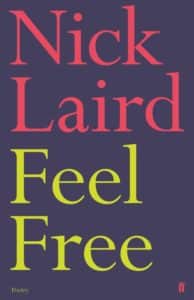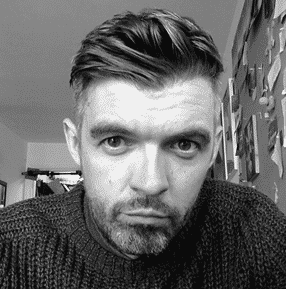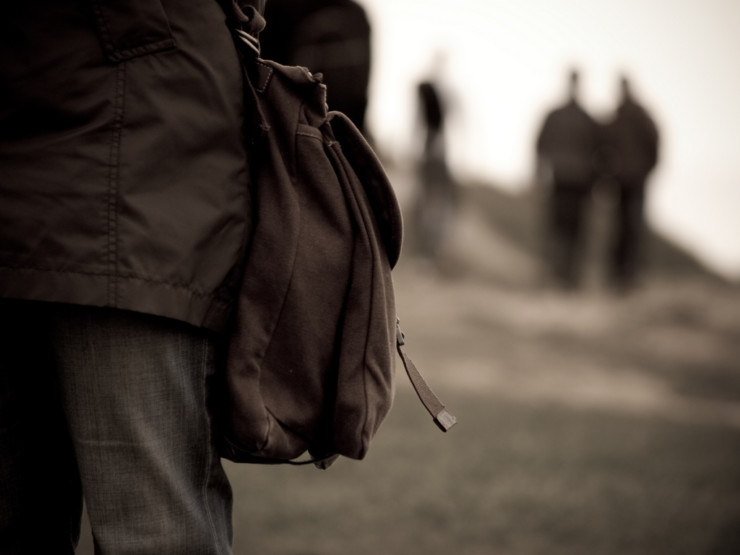It’s like walking into a traditional small bookstore. You see the shelves and tables set out before you. You inhale the smell of paper, ink, and binding. The counter clerk knows the inventory and can make a recommendation within 90 seconds of beginning a conversation. You see an elderly man sitting in an overstuffed chair, adjusting his glasses as he reads.
You think to yourself, “I’ve come home.”
That’s the impression engendered from the very first poem in Feel Free, the newest collection by Irish poet Nick Laird. And that impression is an odd one, given that the first poem (entitled “Glitch”) begins with splitting one’s temple open after a fall at home. Like most poems, though, it’s not really about an accident but about escaping the circumstances we often find ourselves in, creating “the sense / that lasts for hours of being wanted somewhere else.”
Odd, too, to find oneself at home with poems that are largely about pushing against boundaries, those real and artificial lines restraining our freedom. That’s what these 33 poems do, simultaneously probing and pushing against restraints. Whether those restraints are erected by society and social norms or they are self-created, Laird suggests we should be continually pressing against them — that perhaps this is the way we develop a definition of who we are.
It’s easy to find a favorite poem in this collection. As I read each poem, I found myself on a journey of remembrance and self-discovery. This is not to say these are “comfortable” poems — far from it.
Silk Cut

at a junction somewhere in Dublin
when I slipped my hand in his
and met the red end of a cigarette
but now our hearts are broken
we walk down to the Braeside
where we can get a proper pint
and his voice tears up a bit
about the emptiness in the house
and we are going home, waiting
at the turn for the traffic, when I find
I have to stop my hand from taking his
This poem begins with the most common of scenes, a young boy standing with his father at a junction. As the poem continues, the idea of the junction assumes a greater importance, because something is going to be crossed. The boy reaches to hold his father’s hand and finds a lit cigarette.

Nick Laird
The second stanza changes both the scene and the mood. It seems a different time; the boy is older, perhaps a man himself, and he’s walking with his father to “where we can get a proper pint.” What becomes clear is that there has been a loss, perhaps the death of the mother, because there’s now an “emptiness in the house” where they are headed. Laird completes the poem by reaching back to the idea of taking the father’s hand. We’ve come full circle: the man as a boy and the boy as a man still reach for the father’s hand.
Laird has published three previous collections of poetry: Go Giants, To a Fault, and On Purpose. He’s also a screenwriter and the author of three novels — Modern Gods, Glover’s Mistake, and Utterly Monkey. His poetry and fiction have received a number of recognitions and awards, including a Somerset Maugham award, the Aldeburgh Poetry Prize, and the Geoffrey Faber Memorial Prize. Feel Free was shortlisted for the T.S. Eliot Prize. A native of Ireland, he is currently writer-in-residence at New York University.
Using free verse, traditional verse, elegies, and other familiar poetry forms, Laird pushes through our understanding of freedom, defined by both reach and restraint. Feel Free is like that small, traditional bookstore, the one that seems confined but opens up worlds beyond our imaginations.
Photo by Josean Prado, Creative Commons, via Flickr. Post by Glynn Young.
__________________________

“I require all our incoming poetry students—in the MFA I direct—to buy and read this book.”
—Jeanetta Calhoun Mish

L.L. Barkat says
I love the way you introduce this collection as a kind of scene, with both setting and character.
Beautiful featured poem.
Maureen says
Marvelous poem. What a feeling it leaves!
LW Willingham says
This idea of the way boundaries (and our pressing against them) work to help define our identities is a thing I think we can forget. Sometimes, in favor of an argument to stay within the bounds, other times in favor of an argument to push against every restraint. But it’s both, working together.
Thanks for this look at Laird’s work, Glynn.